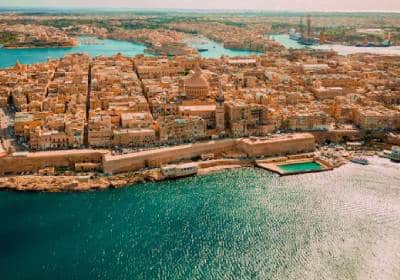Taxes in Malta are designed to attract businesses, citizens and foreign nationals. The country has a tax system where the more you earn, the higher the tax rate. Malta is also known for being business-friendly, with special tax rules for industries like crypto. It has agreements with over 70 countries to avoid people being taxed twice. Additionally, foreign nationals can enjoy tax benefits through programs like the Retirement Program and Global Residence Program, which make it a great place to move to.
This article will give an overview of Malta’s tax system, explaining how personal income tax, corporate tax, social security, property taxes, and more work in Malta. It will also explain who is considered a tax resident and what tax incentives are available for foreigners.
Who pays tax in Malta?
In Malta, taxes must be paid by individuals and businesses that earn income in the country. The following groups are required to pay tax:
Maltese residents: If you live in Malta for more than 183 days in a year, you are considered a tax resident and must pay tax on your worldwide income, which includes income earned in Malta and abroad.
- Non-residents: If you live in Malta for less than 183 days a year, you only pay tax on income earned in Malta, such as salary from a Maltese employer, business profits, or rental income from property in Malta.
- Employees: People working in Malta must pay tax on their salary, bonuses, and other earnings. Employers deduct this tax directly from wages through a system called PAYE (Pay As You Earn).
- Self-employed individuals: If you run your own business or work as a freelancer, you must file your own tax return and pay tax on your business profits.
- Companies: Businesses registered in Malta must pay corporate tax on their profits.
- Property owners: If you earn rental income from property in Malta, you must pay tax on this income.
- Investors: You may also be taxed on dividends, interest, or capital gains earned from investments in Malta.
Who is considered a tax resident in Malta?
You are considered a tax resident in Malta if you live in the country for more than 183 days in a year. This means you must pay tax on your worldwide income, including money earned both in Malta and abroad. If you stay less than 183 days, you are a non- resident and only pay tax on income earned in Malta, like salary, business profits, or rental income. Your tax status also depends on domicile. If Malta is your permanent home, you are taxed on all your income worldwide. If you are not domiciled in Malta, you only pay tax on income earned in Malta or money transferred into the country.
Personal Income Tax in Malta
Malta has an increasing income tax system, meaning the more you earn, the higher the tax rate you pay. This tax applies to both residents and foreigners who earn money in Malta. Tax is charged on different types of income, including salaries, business profits, rental income, pensions, investments, and capital gains. Your tax rate also depends on whether you are single, married, or a parent, as each category has different tax brackets and allowances.
Income Tax Rates for single individuals
Income Range | Tax Rate |
Up to €9,100 | 0% |
€9,101 to €14,500 | 15% |
€14,501 to €19,500 | 25% |
€19,501 to €60,000 | 35% |
Above €60,000 | 35% |
Married couples (joint taxation)
Income Range | Tax Rate |
Up to €12,700 | 0% |
€12,701 to €21,200 | 15% |
€21,201 to €28,700 | 25% |
€28,701 to €60,000 | 35% |
Above €60,000 | 35% |
Parents (parents with children)
Income Range | Tax Rate |
Up to €13,300 | 0% |
€13,301 to €21,700 | 15% |
€21,701 to €29,200 | 25% |
€29,201 to €60,000 | 35% |
Above €60,000 | 35% |
Social Security Tax in Malta
Social Security contributions in Malta are mandatory for both employees and self-employed individuals. These contributions help fund pensions, healthcare, unemployment benefits, and other social services.
- Employees pay 10% of their gross salary, and their employer also pays 10%. These contributions are deducted automatically from wages.
- Self-employed individuals pay 15% of their annual net income based on the previous year’s earnings.
- There is a minimum and maximum contribution limit, which is adjusted yearly.
- Contributions are paid to the Maltese government and are required to qualify for state benefits like pensions and sick leave.
Corporate Tax in Malta
Malta has a corporate tax rate of 35%, which applies to companies on their profits. However, Malta operates a tax refund system that significantly reduces the effective tax rate for shareholders. The refund amount depends on the type of income:
- 6/7 refund (effective tax rate: 5%) for trading profits.
- 5/7 refund (effective tax rate: 10%) for passive income (like royalties or interest).
- 2/3 refund if tax benefits under a tax treaty were used.
- Foreign income: Malta does not tax income earned outside the country unless it is brought into Malta. This means that foreign profits are only taxed if they are transferred into Malta.
- No withholding tax: There is no withholding tax on dividends, interest, or royalties paid to other countries.
- Group relief: Companies within the same group can share tax losses to reduce the overall tax burden. This means that if one company has a loss, it can transfer that loss to another company in the same group, which lowers the total taxes for the group.
- Participation exemption: Under the participation exemption rule, certain foreign income, such as dividends and capital gains from investments, may be exempt from tax in Malta. This applies to income from subsidiaries or investments held in other countries.
VAT in Malta
Value Added Tax (VAT) is a tax applied to most goods and services in Malta. It’s a consumption tax, which means the end consumer ultimately pays it. Businesses collect VAT on behalf of the government and remit it through periodic returns.
Here is an overview of how VAT works in Malta
VAT Category | Details |
Standard VAT Rate | The standard VAT rate is 18%, applied to most goods and services. |
Reduced VAT Rates | - 5% VAT: Applied to hotel accommodation, restaurants, books, and pharmaceuticals. |
- 7% VAT: Applied to tourism services like transportation within Malta and cultural events | |
Zero VAT Rate | Goods and services exempt from VAT or subject to a 0% VAT rate (no VAT charged), including: - Exports of goods outside the EU. |
VAT Registration | Businesses must register for VAT if their annual turnover exceeds €35,000. |
Registered businesses must: Charge VAT on their sales, pay VAT on their purchases and file periodic VAT returns (quarterly or annually) to the Malta Tax Department. | |
VAT Refunds | Businesses can claim VAT refunds on VAT paid for business-related purchases. |
VAT refunds are available if VAT paid on purchases exceeds VAT collected on sales. | |
VAT on Imports | Imported goods into Malta are subject to VAT, paid at the point of entry. |
The standard VAT rate of 18% applies to most imports, with some exceptions for reduced or zero rates. | |
Intra-EU Transactions | - Goods traded between Malta and other EU countries are subject to zero VAT when exported. |
How does Crypto tax work in Malta?
In Malta, cryptocurrency is taxed based on how it’s used, which contributes to its reputation as a Malta tax haven. If you make a profit from buying and selling crypto, it’s considered a capital gain and taxed at 35%. If you actively trade cryptocurrencies, the profits are taxed as part of your income, with rates ranging from 0% to 35%, depending on your total earnings.
For those mining crypto, the income is treated as business income and taxed at 35%. Additionally, Malta crypto tax laws do not charge VAT on cryptocurrency transactions, and businesses may benefit from a tax refund system, which could reduce the tax rate on profits to 5%.
Property Taxes in Malta
Property taxes are mainly focused on stamp duty, capital gains tax, and annual property tax. Here’s how they work:
Stamp duty: When purchasing property in Malta, you must pay stamp duty. The standard rate is 5% of the property’s sale price. However, if you’re purchasing your first home, you may qualify for a reduced rate of 2% up to €200,000. For non-residents, the rate is still 5%.
- Capital Gains Tax (CGT): If you sell property in Malta, the capital gains tax applies. The tax rate is 8% on the profits made from the sale of property. This is the difference between the selling price and the original purchase price. However, if you have owned the property for more than five years, you may be exempt from paying CGT. Also, if the property was your primary residence for at least three years, the sale could be exempt from CGT.
- Annual Property Tax: There is no specific annual property tax in Malta. However, owners may have to pay local council fees for municipal services such as waste collection and maintenance of public areas. These fees vary depending on the location and size of the property.
Double Tax Treaties in Malta
Malta has double tax treaties with over 70 countries to prevent people from paying tax twice on the same income. These treaties help by either reducing tax rates or allowing tax credits for taxes paid abroad. They mainly cover income like dividends, interest, and pensions and aim to make international business and investment easier by reducing tax barriers.
Tax Incentives for Foreign Nationals in Malta
Malta offers tax incentives to attract foreign residents through the Retirement Program and Global Residence Program. These programs provide special tax rates and benefits for people who want to move to Malta:
The Malta Retirement Programme (MRP) allows non-EU, non-EEA, and non-Swiss retirees to move to Malta and benefit from tax perks. To qualify, applicants must own or rent a property in Malta, have health insurance covering both Malta and the EU, and meet certain financial requirements. Retirees pay a 15% tax on their foreign pension income brought into Malta, with a minimum annual tax of €7,500. Employment is limited, but non-executive roles are allowed. Retirees are encouraged to spend at least 90 days a year in Malta.
The Malta Global Residence Program (GRP) is for non-EU/EEA nationals who want to live in Malta and enjoy lower taxes. To qualify, applicants need to have an annual income of around €100,000 and show they are financially stable. They must also either buy or rent a property in Malta that meets certain value requirements. The program offers a flat 15% tax rate on foreign income, with a minimum annual tax of €15,000. Income earned in Malta is taxed under the normal Maltese tax rules. The residence permit is usually given for one year and can be renewed if the requirements are still met. Family members like spouses, children, and dependent parents can also join the program.
As part of our commitment to providing transparent and reliable services, we are proud to be a licensed agent in Malta, holding the official license number AKM-AGEN. This certification demonstrates our dedication to the highest standards in the investment migration industry and further enhances our ability to offer expert guidance and support to our clients.
How Can Global Citizen Solutions Help You?
Global Citizen Solutions is a boutique migration consultancy firm with years of experience delivering bespoke residence and citizenship by investment solutions for international families. With offices worldwide and an experienced, hands-on team, we have helped hundreds of clients worldwide acquire citizenship, residence visas, or homes while diversifying their portfolios with robust investments.
We guide you from start to finish, taking you beyond your citizenship or residency by investment application.

Frequently Asked Questions about Taxes in Malta
What is the tax rate in Malta?
Malta has a progressive tax system, with rates ranging from 0% to 35%. Individuals pay higher taxes as their income increases, while the first €9,100 of income is tax-free for single individuals.
Is there a tax on foreign income in Malta?
Malta generally does not tax foreign income unless it is brought into the country. However, if foreign income is remitted to Malta, it may be subject to a flat tax rate depending on the program or residence status.
How does the VAT system work in Malta?
Malta applies a standard VAT rate of 18%, with reduced rates of 5% and 7% for certain goods and services. There are also exemptions and zero-rated items like exports and medical services.
Are there tax incentives for retirees in Malta?
Yes, under the Malta Retirement Programme, retirees who are non-EU/EEA nationals can benefit from a flat 15% tax on their pension income, with a minimum tax of €7,500 per year.
What is the tax rate for businesses in Malta?
Corporate tax in Malta is generally set at 35%. However, foreign businesses may benefit from tax refunds, which can reduce the effective tax rate significantly, especially for trading companies.
Is capital gains tax applicable in Malta?
Capital gains are taxed in Malta, but there are exemptions for long-term capital gains on the sale of property under certain conditions. Additionally, tax rates on capital gains vary depending on the type of asset sold.
What is the inheritance tax in Malta?
Malta does not have a separate inheritance tax. However, a transfer of property or assets through inheritance may incur stamp duty, which ranges from 3.5% to 5% on the market value of the property.

 Maltese residents: If you live in Malta for more than 183 days in a year, you are considered a tax resident and must pay tax on your worldwide income, which includes income earned in Malta and abroad.
Maltese residents: If you live in Malta for more than 183 days in a year, you are considered a tax resident and must pay tax on your worldwide income, which includes income earned in Malta and abroad. Stamp duty: When purchasing property in Malta, you must pay stamp duty. The standard rate is 5% of the property’s sale price. However, if you’re purchasing your first home, you may qualify for a reduced rate of 2% up to €200,000. For non-residents, the rate is still 5%.
Stamp duty: When purchasing property in Malta, you must pay stamp duty. The standard rate is 5% of the property’s sale price. However, if you’re purchasing your first home, you may qualify for a reduced rate of 2% up to €200,000. For non-residents, the rate is still 5%.
